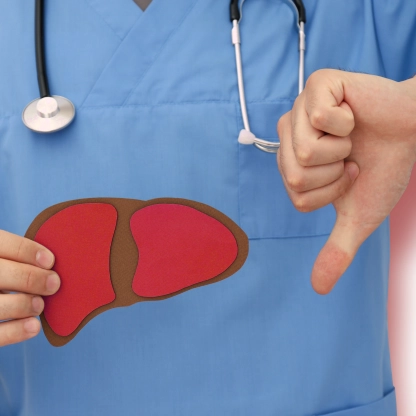
Liver Diseases
Frequently asked questions
- Metabolic dysfunction-associated steatotic liver disease: Fat deposits in the liver hinder its function, potentially leading to severe damage.
- Drug-induced liver injury (DILI): Reactions to medications, like cardiovascular or antibiotic drugs, can harm the liver in some individuals due to genetic or environmental factors.
- Hepatitis: Inflammation of the liver caused by viruses like hepatitis A, B, and C, resulting in symptoms like fever, abdominal pain, and jaundice.
- Cirrhosis: Long-term damage, often from hepatitis or excessive alcohol, leads to permanent scarring, hindering liver function.
- Autoimmune hepatitis: The body's immune system attacks the liver, causing inflammation and damage, possibly leading to cirrhosis if untreated.
- Liver cancer: Often follows cirrhosis; hepatocellular carcinoma is the most common type of liver cancer.
- Liver failure: Can be caused by various factors like infection, genetic diseases, or excessive alcohol consumption.
- Alcohol related liver disease: Arises from excessive alcohol consumption, impacting liver health.
- Cholestasis: Blockage of bile flow from the liver, caused by medications, pregnancy, tumors, or gallstones.
- Wilson's disease: Rare inherited disorder causing copper buildup in the liver and other organs, treatable with proper diagnosis.
- yellowish eyes or skin
- pain or swelling in the abdomen
- swelling in the legs or ankles
- itchy skin
- dark urine
- chronic fatigue
- nausea or vomiting
- loss of appetite
- bruising easily
- pale stool color. Also, if you are at high risk from having MASLD and have comorbidities, this could also mean your liver is likely to be unhealthy, but this requires a proper diagnosis from your doctor to determine whether you have MASLD.
Your liver's health can be affected by various conditions and diseases, some of which include:
Remember, seeking medical advice is crucial for proper diagnosis and treatment of these liver conditions
Although liver disease may not come with any symptoms, you might notice some of the following:
Your liver is a vital organ in the body, whose damage certainly affects your overall health and sometimes comes without any noticeable symptoms. Liver damage can have far-reaching affects, not only impacting its own numerous functions, but also on the well-being of other organs and tissues. It can even influence your overall mood, energy level, vitality, sleep patterns, behavior, and even your physical mobility.
Yes, diabetes increases the risk of metabolic dysfunction-associated steatotic liver disease (MASLD), ranging from simple fatty liver to severe conditions like metabolic dysfunction-associated steatohepatitis (MASH) and cirrhosis. In fact, 26% of those with type 2 diabetes have MASLD globally*. Insulin resistance in diabetes promotes liver inflammation and fibrosis, and there is also an incidence of MASLD in those with diabetes. Tight glycemic control, lifestyle changes, and regular liver function monitoring are essential to manage diabetes and reduce the risk of liver-related complications such as liver failure and cancer. *Cao, L., An, Y., Liu, H. et al. Global epidemiology of type 2 diabetes in patients with NAFLD or MAFLD: a systematic review and meta-analysis. BMC Med 22, 101 (2024). Global epidemiology of type 2 diabetes in patients with NAFLD or MAFLD: a systematic review and meta-analysis - BMC Medicine
Yes! The essential phospholipids Essentiale® have been found to help to be an effective supplementary treatment for metabolic fatty liver disease. / Yes! The essential phospholipids Essentiale® have been found to help to be an effective symptom-relief for metabolic fatty liver disease. *Adjust based on the approved indication in that country.
Obesity often leads to metabolic-associated steatotic liver disease (MASLD) due to excess fat accumulation in the liver. This can progress from hepatic steatosis to more severe conditions like metabolic-associated steatohepatitis (MASH), causing liver inflammation and damage. Consequently, obesity is a significant risk factor for MASLD and its complications, underscoring the importance of weight management and lifestyle changes for liver health.
There are numerous reasons why you may have an unhealthy liver. The liver is a vital organ that processes nutrients, filters toxins from the bloodstream, produces bile to aid digestion, and metabolizes drugs. However, it can lead to various health issues when it's not functioning correctly. Your liver might have problems due to excessive alcohol consumption; metabolic dysfunction-associated steatotic liver disease (MASLD), where fat accumulates in the liver cells; viral and autoimmune hepatitis; certain medications, herbal supplements, and toxins that harm the liver; genetic disorders; obesity and a poor diet (increases the risk of MASLD and other conditions); biliary tract disorders; and other health issues like cancer or vascular disorders.
Loss of appetite, known as inappetence, can result from various factors like stress, illness, medications, or mental health issues, leading to several health risks including weight loss, weakened immune system, exacerbation of existing conditions, psychological stress, nutritional deficiencies, dehydration, impaired wound healing, muscle loss, mental health implications, compromised organ function, and reduced medication effectiveness. Prompt identification of the cause and implementing appetite-stimulating strategies are crucial. Persistent loss of appetite requires medical attention to determine the underlying cause and appropriate treatment.
How to take care of your liver?
Get inspired by choosing articles from our library
Our product









%20(1)%20(1).webp)